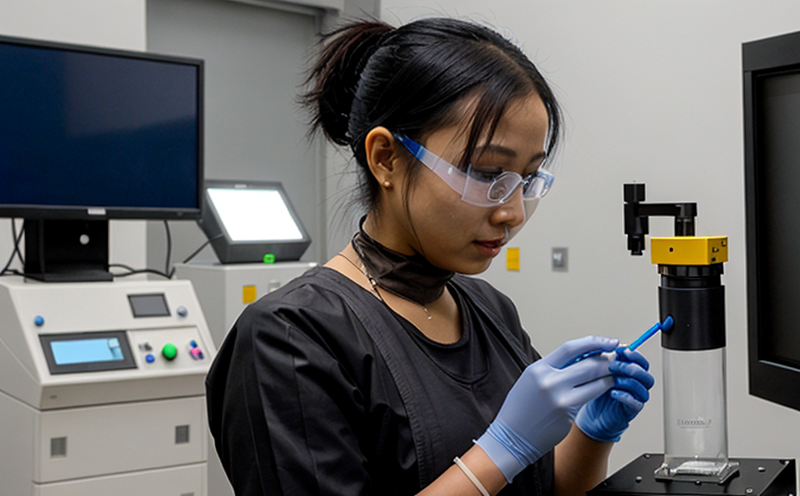ASTM D5673 Metal Content Testing of Nanoparticles in Water Samples
The testing of metal content in nanomaterials within water samples is critical for ensuring environmental compliance and product safety. ASTM D5673 provides a standardized approach to quantifying the concentration of metals present in nanoparticles dispersed in aqueous solutions, which is essential for industries handling nanotechnology applications.
Environmental nanomaterials are increasingly being used in various sectors such as electronics, cosmetics, and pharmaceuticals. However, their potential impact on aquatic ecosystems has raised concerns among regulatory bodies and environmental groups. ASTM D5673 aims to address this by establishing a methodology for detecting and quantifying metallic elements within these nanoparticles.
The test involves several key steps: sample preparation, digestion of the nanoparticle suspension in appropriate chemical reagents, instrumental analysis using techniques like ICP-MS (Inductively Coupled Plasma Mass Spectrometry), and finally, interpretation of results based on established standards. Understanding the metal content helps researchers and manufacturers assess risks associated with exposure to these materials.
For accurate measurements, proper sample handling is crucial. This includes ensuring that the nanoparticle suspension remains stable during digestion and that all metallic compounds are effectively extracted into solution. Once prepared, the samples undergo rigorous analysis using ICP-MS equipment capable of detecting even minute concentrations of metals.
The reported results provide valuable insights into the potential environmental impacts of nanomaterials usage. Compliance with relevant regulations like ISO 17820 or ASTM E595 ensures that products meet global standards for safety and sustainability. By adhering to these guidelines, organizations can demonstrate their commitment to responsible nanotechnology development.
In conclusion, ASTM D5673 plays a vital role in safeguarding both human health and the environment by offering a reliable method for assessing metal content levels in water-suspended nanoparticles. This knowledge enables informed decision-making regarding product design and production processes.
Why It Matters
The importance of ASTM D5673 cannot be overstated given its direct relevance to environmental protection and public health. Nanoparticles have unique physical, chemical, and biological properties that differ significantly from their larger counterparts. As a result, they can behave differently when introduced into natural environments or consumed by living organisms.
Metals within these nanoparticles may accumulate in aquatic systems, affecting biodiversity and ecosystem functioning. Elevated levels of certain metals could lead to toxicity issues for aquatic life forms, including fish and other wildlife species that rely on clean water sources. Additionally, human exposure through ingestion or inhalation poses potential risks to health.
- Ensures compliance with international environmental standards
- Promotes safer product development in nanotechnology industries
- Facilitates better understanding of nanoparticle behavior in different environments
- Aids in identifying any adverse effects on human health and the environment
- Supports sustainable practices by providing data for informed decisions
By employing ASTM D5673, stakeholders can gain critical information about metal concentrations in nanomaterials, enabling them to take proactive measures towards minimizing risks associated with their use.
Eurolab Advantages
At Eurolab, we offer comprehensive environmental nanomaterials testing services tailored specifically for ASTM D5673. Our team of experts is well-versed in the nuances of this standard and can provide accurate results through our state-of-the-art facilities.
We prioritize quality assurance throughout every step of the process, from sample preparation to final analysis and reporting. Our advanced instrumentation ensures precise measurements down to nanogram levels, which are essential for detecting trace amounts of metals within nanoparticles.
Our commitment to excellence extends beyond technical capabilities; we also emphasize clear communication with clients regarding test procedures, expected outcomes, and any necessary follow-up actions. This approach fosters trust and long-term partnerships between us and our customers.
In addition, Eurolab adheres strictly to relevant international standards such as ISO 17820 and ASTM E595, ensuring that all tests conducted meet the highest industry benchmarks. By leveraging these resources along with our experienced personnel, we deliver reliable data that supports informed decision-making across various sectors.
Why Choose This Test
- Mandates precise measurement of metal content in water-suspended nanoparticles
- Promotes compliance with international environmental regulations
- Fosters safer product development practices in nanotechnology industries
- Facilitates better understanding of nanoparticle behavior in aquatic environments
- Supports sustainable business operations by providing essential data for decision-making
- Ensures accuracy and reliability through rigorous quality assurance measures
By choosing ASTM D5673 testing, organizations demonstrate their dedication to responsible nanotechnology management. Our services are designed to meet these high standards while offering unparalleled expertise in environmental nanomaterials analysis.





